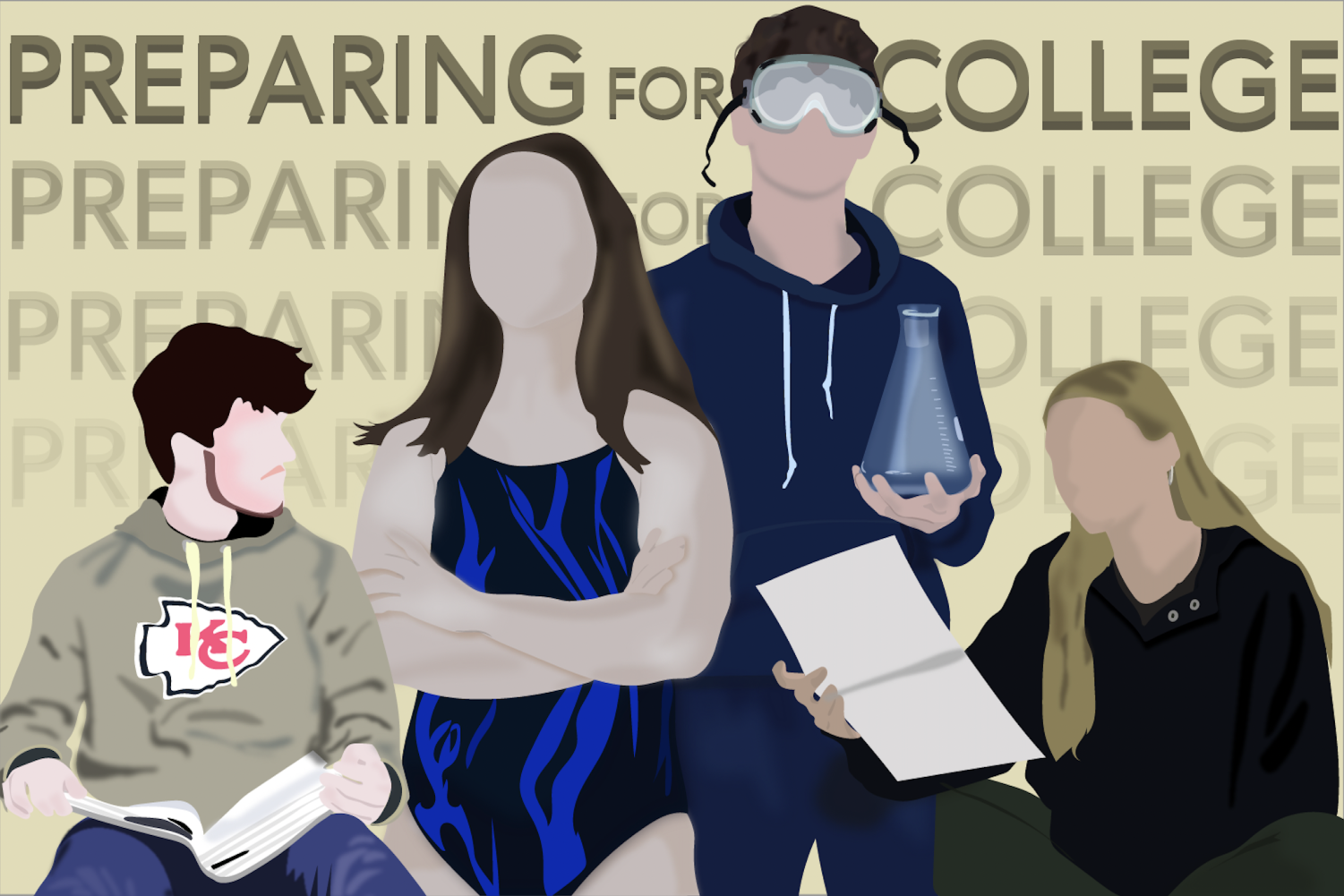Students study, train and explore in preparation for their college journey
February 8, 2023
Whether it be athletic recruitment, standardized testing or rigorous class schedules, students navigate many complex worlds while preparing for college. Several of these students share their experiences with this preparation and what has helped them to plan for life after high school.
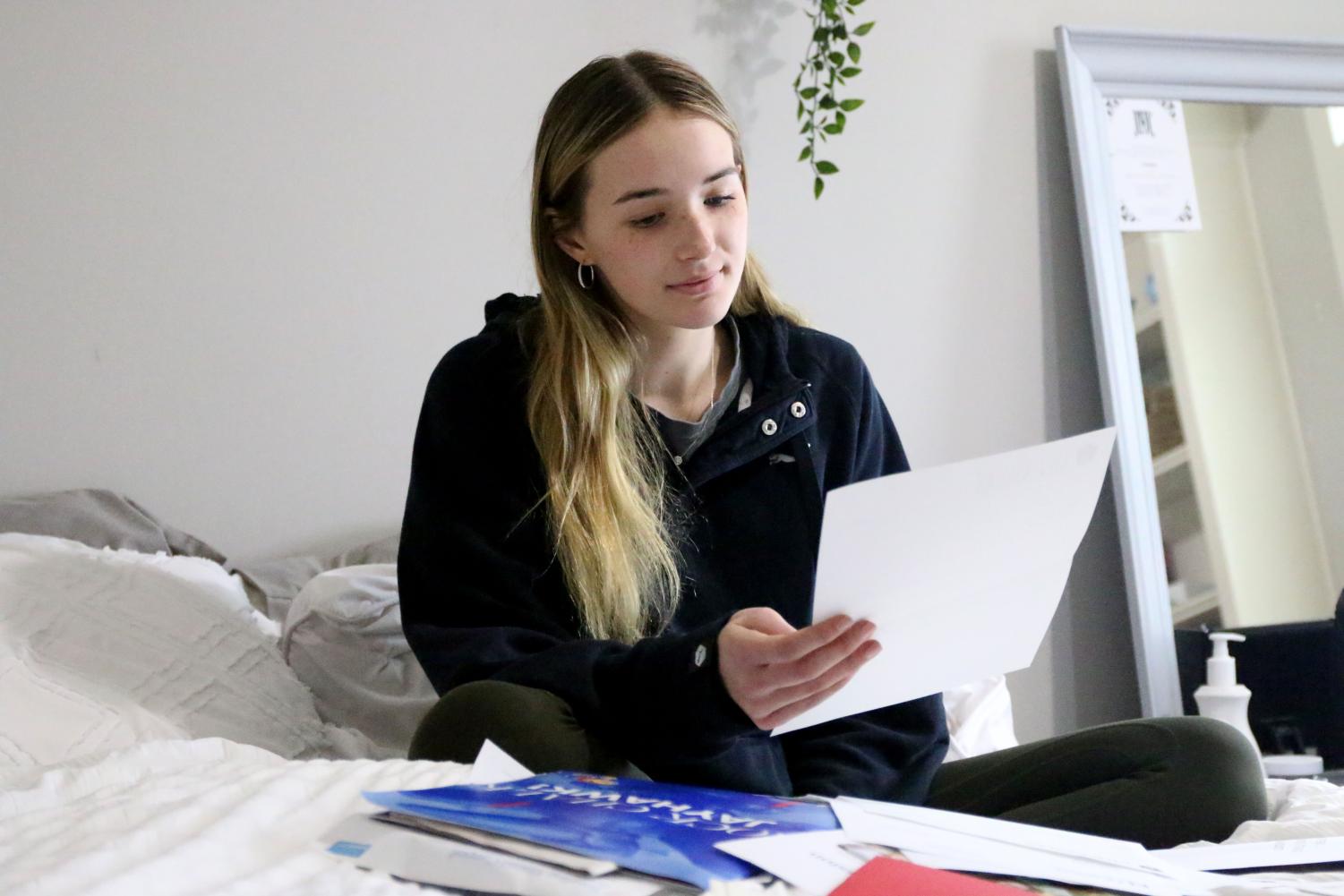
Sitting on her bed, senior Libby Strathman looks through her collection of college acceptance letters. Strathman, who applied to eight different universities, carefully crafted her college resume by getting involved in various extracurriculars.
Senior Libby Strathman prioritizes her extracurriculars as a way to make connections
Preparing for college is, for many students, all in the extracurriculars. One of these students is senior Libby Strathman whose extracurriculars have not only helped her prepare for college, but also helped her to find the right major for her.
Strathman is involved in a wide variety of activities and sports including the school store, the Catty Shack, where she serves as the president, National Honor Society where she serves as the president, National English Honor Society where she serves as the vice president, Relay for Life where serves as an executive leadership officer, Youth for Refugees where she serves as an officer, DECA, Spanish National Honor Society, Jag Pride, varsity track for three years and tennis for two years.
Working at the Catty Shack and being a member of DECA introduced Strathman to the world of business. These activities have helped Strathman to settle on double majoring in finance and accounting at an undecided university. Strathman describes what initially interested her about these activities.
“I joined DECA, which is a student business hands-on learning [activity] last year, my junior year, and I was pretty good at it,” Strathman said. “I thought it was really fun. Then this year, I am president of our school store, so that has given me a lot more of a firsthand look into how businesses run.”
In addition to helping her decide on a major, her many extracurricular activities have provided Strathman with a network of people to help her succeed.
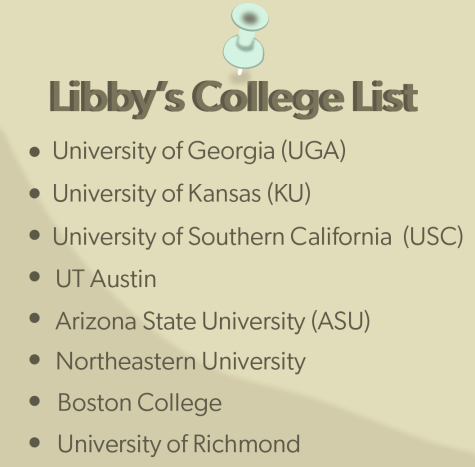
“I really got involved in extracurriculars and I just tried to set myself up with as many connections as I could,” Strathman said. “I think more so than just having something to put on your application, being a part of extracurriculars really gives you a network of people who want you to succeed and do well. I think that’s been really beneficial to me.”
Even in sports, which Strathman does not plan on continuing in college, she has learned valuable skills to prepare.
“I think [sports] gave me a lot of discipline,” Strathman said. “There’s this theory. I can’t remember the name of it; basically it’s your work will expand to fill the time you allot for it. So honestly, the biggest thing with sports was I was busy all the time. I had a pretty structured schedule and that just forced me to develop pretty good study habits where [I would say to myself] ‘hey, you have two hours for this and that’s the most you’re getting so you better get it done.’ I think that was really beneficial.”
Outside of extracurriculars, Strathman finds it important to stay ahead of schedule with academics and college applications. This summer, Strathman was able to write most of her college application essays allowing her to focus all of her attention on academics during the school year. She advises anyone going through the college application process to do the same.
“I would say try and start as early as you can,” Strathman said. “If you have any idea of what path you’re wanting to go on, I would say really focus on the extracurriculars and those resume builders you do around that singular interest because that’s going to make you really stand out. I think to have more of a spike in your application rather than in general overall [helps]. But my base advice I could give would just be don’t stress over anything.”
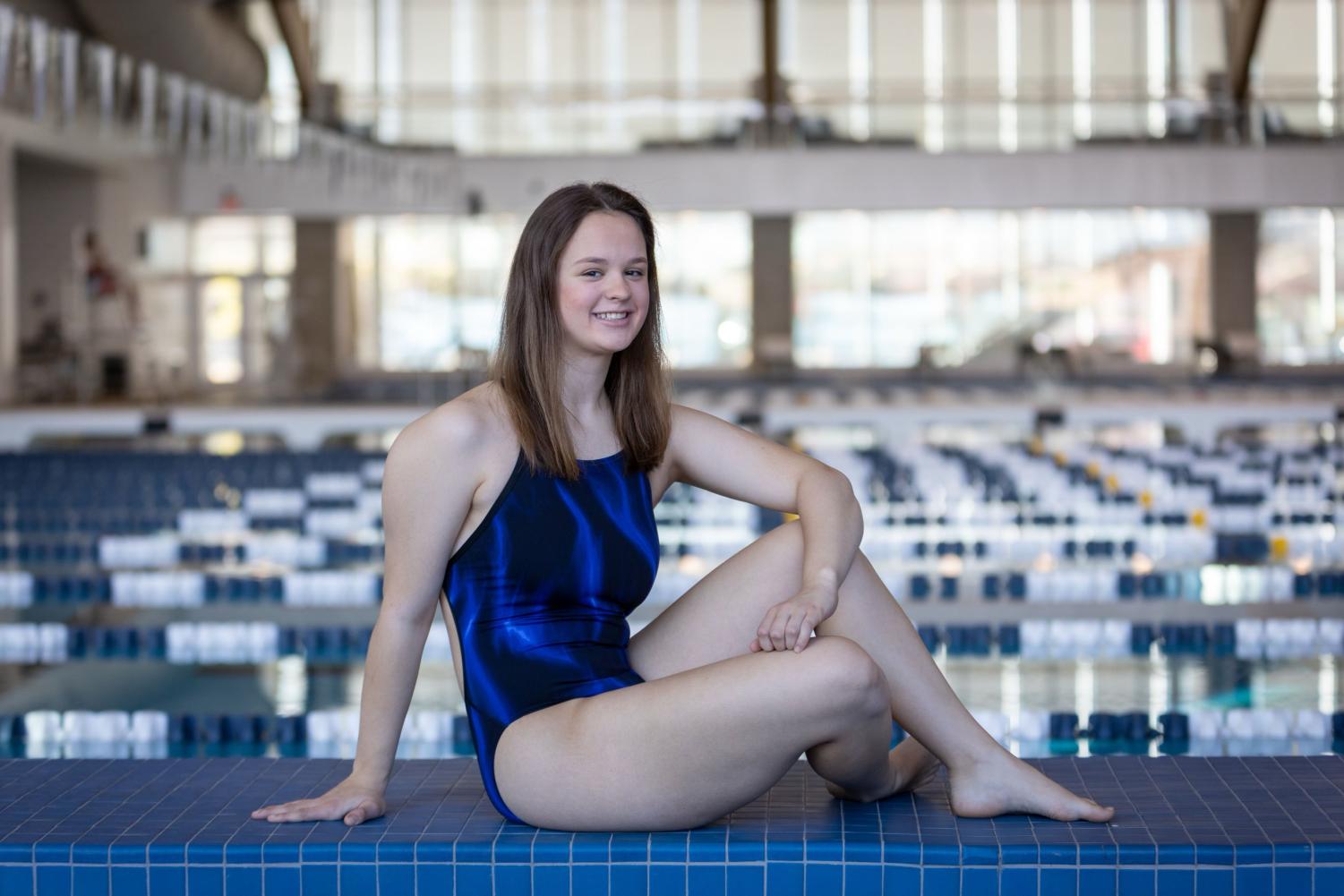
Senior Cassie Frias is to committed to attend Southwest Minnesota State University on a dive scholarship. Frias’ desire to dive collegiately greatly influenced her college prep journey.
Senior Cassie Frias focuses on the final details of college prep after having committed to a school
Senior Cassie Frias has already decided what school she will attend after high school. Now, she is able to focus on the more enjoyable aspects of preparation while reflecting on her experience with recruitment.
Frias committed to attending Southwest Minnesota State on a dive scholarship November 2022. She chose SMSU because the academic aspects of the school fit what she was looking for from campus size to intended major.
Frias also fell in love with their swim and dive program, largely the team’s positive energy; she described how the team members reached out to her and followed her Instagram account. The team’s coach was also a big part of this.
“[Head] Coach Marty [Wahle] is one of the nicest people I’ve ever met,” Frias said. “He will just text me sometimes and be like, ‘hey, how was your day?’ He was super, super nice and helpful during the recruiting process by reaching out, scheduling an official visit [and] planning all the fun stuff. He’s very passionate about growing the swim and dive program because they haven’t had a program since the late 60s and they brought it back. The 2019-2020 school year was the first year that they had had a women’s swim and dive so I get to be a part of history.”
Getting the dive scholarship not only required Frias to do well athletically, but to also navigate the world of college recruiting. Frias describes what this looked like for her.
“I had a dive Instagram [account],” Frias said. “That is how pretty much all coaches found me and they would reach out to me. There were some schools that I reached out to first but SMSU was not the case for that. They reached out to me in mid-May because they saw I had a my dive Instagram and then I also had a recruiting profile.
Though, in addition to diving, Frias understands that staying on top of her academics is important for college too. She describes the weighted classes she is taking to prepare.
“I’m taking AP Statistics for Baker credit so I don’t have to take statistics in college,” Frias said. “Anatomy and Physiology is getting Baker credit even though it transfers as an elective everywhere, which is very sad, but I’m still getting [four credits from it]. Then I get five elective credits from French and that’s just this year. Last year I got my AP Bio credit. Just staying on top of my classwork [is important]. I knew coming into this school year that I wanted to do physical therapy so it was easier to pick what classes I wanted to take that would help me towards that goal.”
Staying organized has also helped Frias to stay on top of planning and classwork. Specifically, Frias uses an agenda to manage her time.
“I love my agenda,” Frias said. “I fill it out every day and each day it has the four classes I have that day. Then I write what homework there is and if there’s no homework or when I get it done, it’s extremely satisfying.
Having gone through the college selection process, Frias can now relax and focus on the fun parts of college preparation, like choosing a roommate.
“It’s not necessarily so stressful anymore because I’m committed,” Frias said. “Now that that’s done, it’s just making sure I get every deadline for housing, picking roommates and actually registering with classes.”
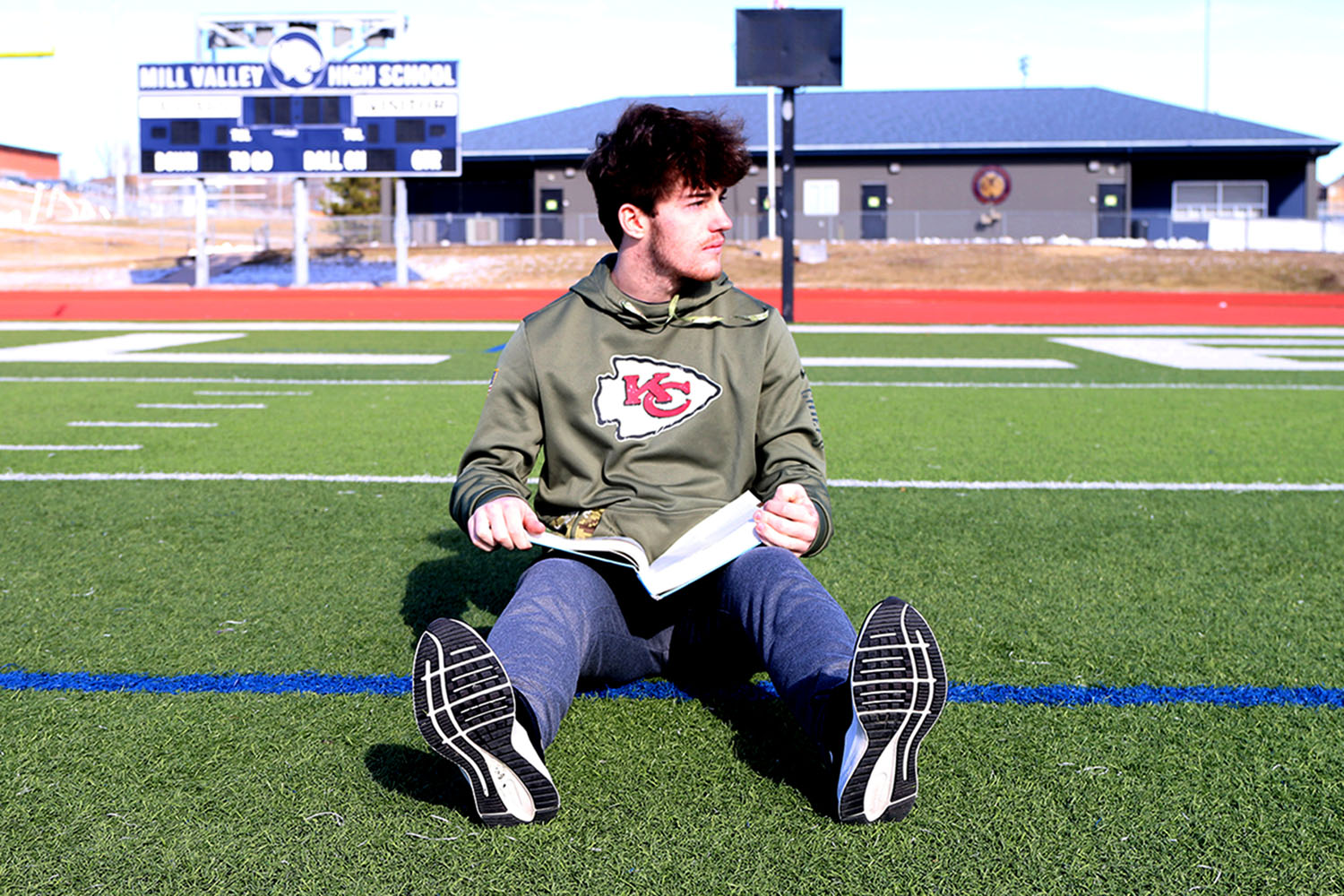
Junior Tristan Baker remains undecided over wanting to attend college for academics or athletics. Baker, a football player and AP student, plans to focus on school first before giving any consideration to playing collegiate sports.
Junior Tristan Baker balances athletics and academics to stay ahead in both fields
For junior Tristan Baker, just focusing on doing his best academically and athletically is the best way to prepare for college.
Baker is a varsity football player and would ideally continue playing sports in college. Currently, Baker is focusing on communicating with colleges, but is not looking at any specific ones. This is also a source of stress for him.
“I’m definitely worried about football and colleges reaching out to me or if I have to reach out to them,” Baker said. “Right now, I’m not looking at a ton of stuff because I didn’t get my name out there enough last summer. So my focus now is to try and get my name out there and see if I can get anything cool.”
To get his name out there, Baker prioritizes his athletics even during the offseason by continuing his training at TopSpeed Speed & Conditioning.
“This offseason, the football team has lifting [in the] morning every week, for four days a week and then I have my own training that I do at TopSpeed,” Baker said. “We do a lot of work on my speed and my power so I can be the best player I can possibly be and maybe get my name out there.”
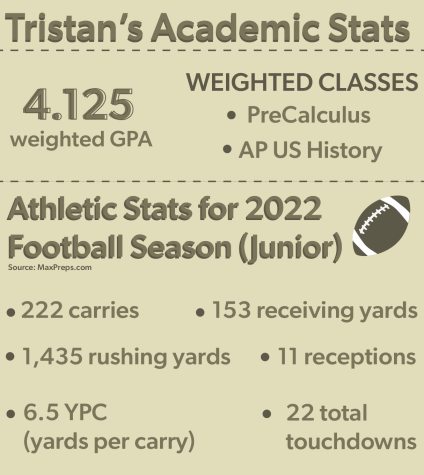
But for Baker, preparing for college is not just about athletics. Baker believes that having good academics is also crucial for student athletes.
“[Staying ahead] academically helps a lot because, obviously, you stay eligible if you have high grades but at the same time, we’re not just athletes; we’re student athletes and the student always comes first,” Baker said. Athletically, it’s always important to prepare yourself. If you’re not the most prepared you can be for a game it makes it a lot harder to focus on what our role is and what we can do to be the best player we can for our team.”
Baker focuses on many aspects of academics, like GPA and grades, but is currently prioritizing studying for the ACT.
“So academically, my main focus is the ACT right now,” Baker said. “If I can get a good score on my ACT that’ll help relate to scholarships. The more money I get paid for college, the better it’ll be for me in my future.”
His preparation academically and athletically must come together in a balance, though, to adequately prepare for college and stay ahead.
“The main balance is to make sure that I focus on getting my schoolwork done and then doing my football work after,” Baker said. “If I get my schoolwork done, it makes my life a whole lot easier to watch film or go out and practice.”
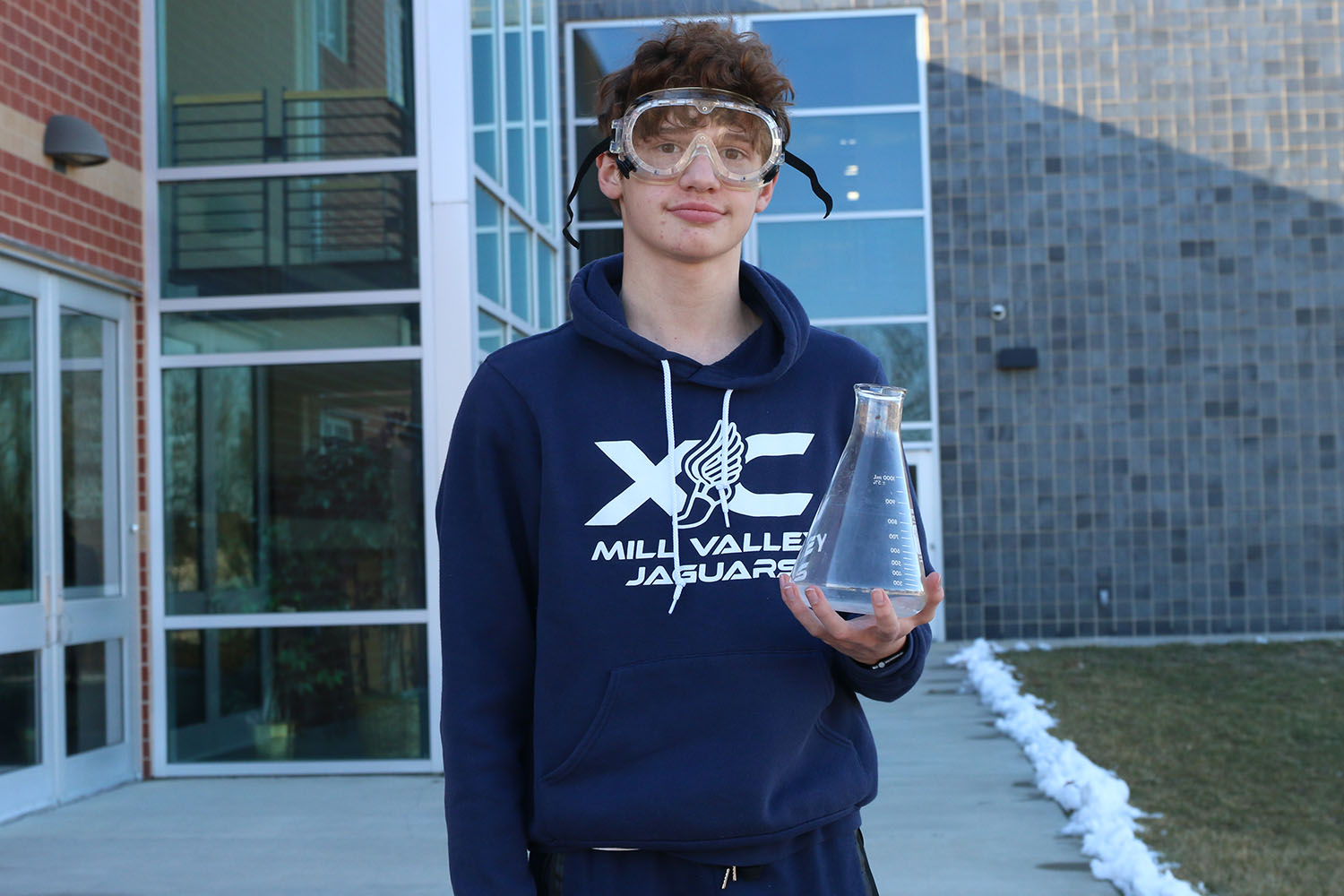
Though he is two years out from deciding on a college, sophomore Dalamar Read uses a personally-developed criteria checklist to select universities for his college application catalog.
Sophomore Dalamar Read meticulously plans ahead to stay on track with his post-high school goals
According to sophomore Dalamar Read, preparing for college is all in the planning, specifically with regards to classes. Read plans on majoring in something related to chemistry in college and has planned out his high school class schedule to help reach this goal.
Read has planned out his high school schedule down to the class and has even begun looking at specific colleges like KU, K-State, Harvard, Duke, Caltech and London Imperial College. Read maps out this planning on a spreadsheet. He describes the classes he plans on taking his junior and senior years to stay on track with his plan.
“Next year, I’m taking AP Chemistry with Biotechnical Engineering at CTEC,” Read said. “Then I’m taking AP Physics I and II senior year, maybe AP Physics C, AP Biology and Introduction to Organic Chemistry.”
Additionally, Read’s rigorous planning and preparation will potentially allow him to not only get ahead on college credits, but also save money.
“I want to take all the liberal arts classes like English credits so I won’t have to pay $2,000 a credit-hour for wherever I decide to go,” Read said. “It’s mostly just getting the easier classes out of the way so I don’t have to pay more money for them. That’s especially important for calculus next year. It’ll be a state credit [which] doesn’t transfer too well, [instead] it’ll be showing me what the college class would look like. If I do have to retake Calculus in college, I’ve already seen the material and it’ll be easier to go through. This way I won’t decide that it is too difficult in a 300-person class that costs a lot of money and then drop it and spend more money than necessary.”
On a similar note, Read considers taking dual-credit programs more consistent for college credit than AP tests, so he does programs like College Now, offered by Johnson County Community College, whenever possible.
“If there’s a College Now program, instead of an AP test, I would rather do that,” Read said. “As the AP test seems to be really strict and difficult to pass successfully. I feel like I would have a worse shot at the credit for college if I were to take the AP test.
This sort of planning ahead has also helped Read to consider his post-highschool options wisely.
“I’ve started making a list of [college criteria],” Read said. “I want to narrow down requirements for a college. One particular college that had [a degree I was interested in], the London Imperial College, [made me] think about being out of the United States. I’ve also thought about doing a gap year, or just travel and see where I would want to live. I don’t really know yet. I haven’t made a solid decision.”
Despite the fact that he has not made any final decisions, starting the planning process early has helped Read avoid the college-related stress that many students know all too well.
“[I’m excited about] having a better understanding,” Read said. “Whenever I go into college I know I won’t be lost as a freshman. I’ll know what I’m doing.”
